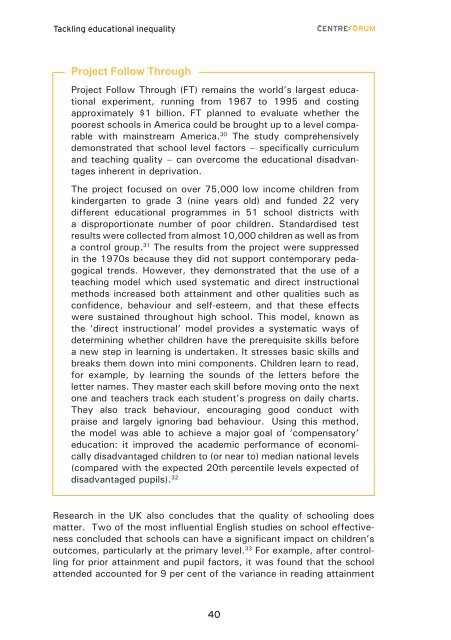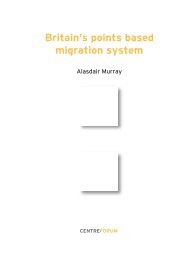Tackling educational inequality - CentreForum
Tackling educational inequality - CentreForum
Tackling educational inequality - CentreForum
Create successful ePaper yourself
Turn your PDF publications into a flip-book with our unique Google optimized e-Paper software.
<strong>Tackling</strong> <strong>educational</strong> <strong>inequality</strong><br />
Project Follow Through<br />
Project Follow Through (FT) remains the world’s largest <strong>educational</strong><br />
experiment, running from 1967 to 1995 and costing<br />
approximately $1 billion. FT planned to evaluate whether the<br />
poorest schools in America could be brought up to a level comparable<br />
with mainstream America. 30 The study comprehensively<br />
demonstrated that school level factors – specifically curriculum<br />
and teaching quality – can overcome the <strong>educational</strong> disadvantages<br />
inherent in deprivation.<br />
The project focused on over 75,000 low income children from<br />
kindergarten to grade 3 (nine years old) and funded 22 very<br />
different <strong>educational</strong> programmes in 51 school districts with<br />
a disproportionate number of poor children. Standardised test<br />
results were collected from almost 10,000 children as well as from<br />
a control group. 31 The results from the project were suppressed<br />
in the 1970s because they did not support contemporary pedagogical<br />
trends. However, they demonstrated that the use of a<br />
teaching model which used systematic and direct instructional<br />
methods increased both attainment and other qualities such as<br />
confidence, behaviour and self-esteem, and that these effects<br />
were sustained throughout high school. This model, known as<br />
the ‘direct instructional’ model provides a systematic ways of<br />
determining whether children have the prerequisite skills before<br />
a new step in learning is undertaken. It stresses basic skills and<br />
breaks them down into mini components. Children learn to read,<br />
for example, by learning the sounds of the letters before the<br />
letter names. They master each skill before moving onto the next<br />
one and teachers track each student’s progress on daily charts.<br />
They also track behaviour, encouraging good conduct with<br />
praise and largely ignoring bad behaviour. Using this method,<br />
the model was able to achieve a major goal of ‘compensatory’<br />
education: it improved the academic performance of economically<br />
disadvantaged children to (or near to) median national levels<br />
(compared with the expected 20th percentile levels expected of<br />
disadvantaged pupils). 32<br />
Research in the UK also concludes that the quality of schooling does<br />
matter. Two of the most influential English studies on school effectiveness<br />
concluded that schools can have a significant impact on children’s<br />
outcomes, particularly at the primary level. 33 For example, after controlling<br />
for prior attainment and pupil factors, it was found that the school<br />
attended accounted for 9 per cent of the variance in reading attainment<br />
40





